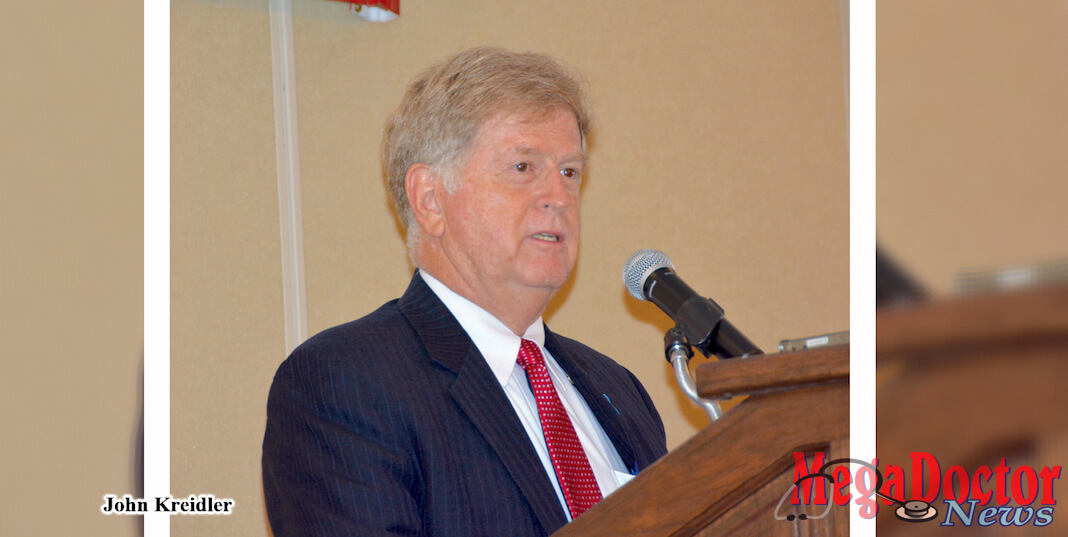
Mega Doctor News
When a person happens to be a cancer survivor, that person is a brave person. But he or she becomes a hero when they make time to share their experience with the community and encourage early detection to save other lives. Such is the case of John Kreidler, a local businessman in McAllen. I first heard his story in 2015.
“Yes, I am a survivor of prostate cancer,” John told an audience hosted by the Hispanic Chamber of Commerce. “I have been cancer free for 12 years.” He said, “I went for the Radical retropubic prostatectomy, a surgical procedure in which the prostate gland is removed through an incision in the abdomen.” It is most often used to treat individuals who have been diagnosed in the early stages of prostate cancer.
According to John, his doctor told him to have it rooted out. Once he knew, he wanted the operation right away or like he said, “yesterday.”
“I found out that it doesn’t work that way, you have to go through all the blood tests and everything. The biggest bugaboo I guess, with guys, is the digital rectal exam. It’s not fun and I worried about it too.”
John remembers that about two or three times his doctor told him he had a bump on his prostate and needed to have a biopsy.
When his doctor explained the requirements of a biopsy, it made him uncomfortable. It happens that it takes twelve needles in the process and he said, “I hate needles.”
But even when he was going through all this experience, he recognized some of the procedures women go through. “I told my wife and my daughter now I know, what you all go through for mammograms and pap smears and they said, ‘yeah welcome to the real-world buddy.’”
So finally, the biopsy was done and two out of the twelve samples were malignant, and that’s when John wanted to root it out “yesterday”.
It was evident that he had fun telling the story, because every time he had the chance, he inserted an expression to make the audience laugh. John has a command of the microphone, so he was successful getting the reaction of the public.
Like when he said, “I couldn’t have robotic surgery because I was too fat, I rode my bicycle for a month before I had my operation and it didn’t help. I was still fat, so I had the open retropubic prostatectomy.” He said, “I was apprehensive of course like most men about incontinence and impotence.”
He told the doctor, “You better be darn careful or I could come back and get you because as a funeral director I can make people disappear and nobody will ever know what happened,” he said jokingly.
John said that he got his name in multiple prayer lists and everything went well. He told the audience that he kept a positive outlook, which meant he was not going to die.
After the surgery, as he was waiting for the doctor’s comments he was thinking about possible answers from his doctor like, ok you got 40 or 50% cure, but the results were much different. “I had a 98% cure as far as he was concerned, and that was fantastic, so I was very excited about that,” John said.
“I am very thankful to God that I made it through that because three months later I had a malignant melanoma right here on my chest. I had this thing here for years, and it was just neat looking like the island of Española,” he said.
As he described, he said that part of it was dark brown and part of it was light brown, and it didn’t look like any other pictures of any male melanoma that he had seen in his doctor’s office.
John said that he was not worried, but his wife ‘beat him with a baseball bat’ so he decided to go for a biopsy. Two weeks later he was called with bad news. He said, “It’s a malignant melanoma.”
John had no symptoms, but his doctor told him, “you are going to have problems, so it’s better that you do something about it now.” He is doing well because of early detection. Both, the prostate and the melanoma, were removed in time with no more consequences.
His message is for all the guys over forty is, “Have a digital rectal exam, the PSA test and then attend to our group and listen to the people talk about our survivors.”
The support groups meet at Texas Oncology-McAllen. They host support groups for breast cancer survivors and prostate cancer survivors. Additionally, the American Cancer Society routinely hosts information forums and provides support and resources at their location. For more information on dates and times, please contact our office at (956) 687-5150.









